“The Flash” as the Modern Equivalent of 1960’s “Batman”
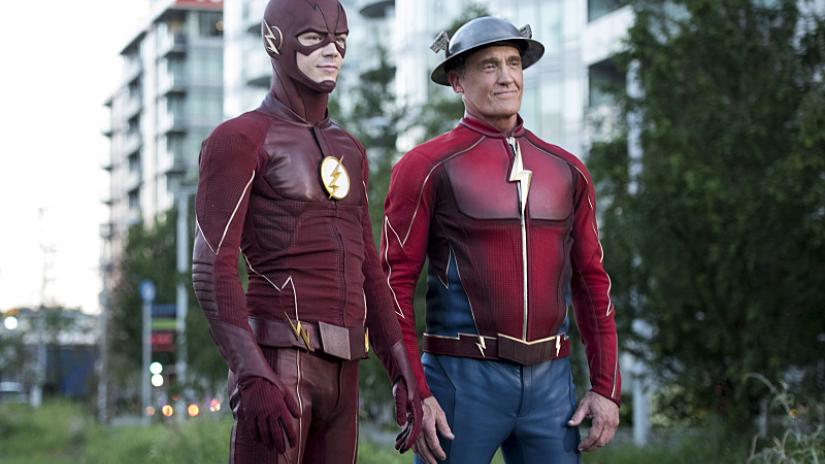
If “run, Barry, run” wasn’t a silly enough tagline/inadvertent reference to Forrest Gump, pretty much everything else about the CW’s The Flash is enough to turn away any viewer looking for a remotely-serious TV series. Currently in its third season, The Flash is a television adaptation of the DC comics of the same name featuring a character endowed with the ability of super speed. Barry Allen is the fastest man alive: one of several Central City citizens-turned-metahumans after an accident involving a particle accelerator. The character was born out of the Silver Age of comics, defined primarily by its preposterous premises and weird and wacky characters. The character’s over-the-top origins have been a strong influence on the show, noteworthy for its light tone against a backdrop of dark re-imaginings of comic books on the small screen as well as in cinema.
The Flash began as a spin-off from Arrow, which focuses on the DC hero “Green Arrow” whose weapon of choice is a bow and arrow. Arrow was the first show to the comic book TV scene (now populated by Supergirl, Legends of Tomorrow, Legion, etc.) following the finale of the long-running Smallville (2001-2011). In fact, due to the popularity of the Green Arrow character featured on Smallville, the CW picked up the Arrow pilot the same year the Superman origin show ended. After a special appearance from Barry Allen in a few season 2 episodes, the network got the go-ahead to start up a second series in the Arrowverse. Despite being a by-product of another show, The Flash quickly exceeded Arrow‘s ratings and reviews. Season 5 of Arrow debuted with 1.87 million viewers, while in the same year (2016), The Flash‘s third season premiere garnered 3.17. The spin-off show has also received acclaim from TV critics; in its first three seasons, the show has averaged 95% positive critical reviews (as sampled by Rotten Tomatoes). It must be a good series then, right?
The mass appeal of The Flash is a head-scratcher, to say the least. It endures as one of the most talked-about shows on television, with a huge weekly fan-base. Clearly there’s something about the show that brings back millions of viewers every week, but it isn’t the quality. Although the main cast is quite good (namely an on-point Grant Gustin in the lead role), everything from the visual effects to the dialogue to the sound mixing screams B-grade campiness. Virtually every villain that appears on The Flash has been a carbon copy of the last: a finger-twiddling, mustache-twirling cliché with no real motive (Eboard Thawn goes to extensive lengths to . . . torment the Flash? Zoom breaches multiple universes to give people hope . . . and then take it away?). From Captain Cold to the Reverse-Flash to Professor Zoom, the bad guys are consistently written in the same way. It’s almost as if the writers use the same caricature template for their villains, only swapping out the name and actor on a weekly basis. Not only do the baddies have cheesy lines, their costumes look cheap and the performances are wildly over-the-top. There’s nothing threatening or sinister about Central City. It just seems more like playground for immature adults playing dress-up.
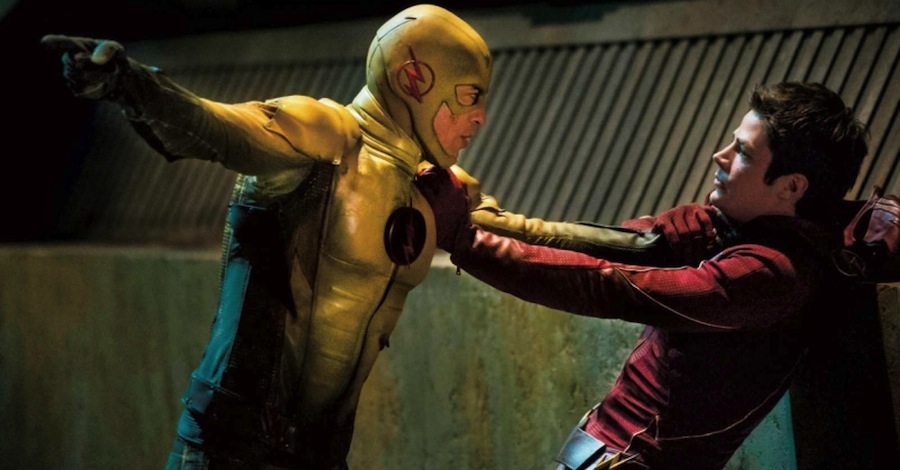
The visual aesthetic of The Flash is another distraction. Although TV budgets are much more limited than Hollywood productions, some of the effects that the VFX designers try to pull off are unforgivable. In many cases, actors are replaced entirely with CGI doubles, and the results are very obvious. This effect has been attempted in the past – mostly during the early 2000’s when computer generated imagery was still relatively new (ie. the army of Agent Smiths in The Matrix: Reloaded). It’s been over a decade since then, and critics and audiences have frequently voiced their opinion that it simply does not work. Further, significant advancements have been made with digitally recreating human faces (ie. Furious 7, Rogue One), which means viewers have already been initiated with far superior technology than what is being thrown at the screen in The Flash, making its attempts all the more unconvincing.
Perhaps the most ridiculous element of The Flash is the silly pseudo-science being conducted by characters who are all supposed to be scientists. In “Rogue Time” (Season 1, Episode 16), Cisco Ramon, a mechanical engineer, is kidnapped and forced to create a weapon; in just one afternoon, Ramon builds a fully-functional gun that turns any material into gold. If that sounds absurd, you won’t believe the other “scientific” experiments, inventions, and methods (not to mention nonsensical time travel) used in this show set in the modern era. Where Arrow relies on characters and story lines absent of super powers, The Flash embraces the illogical zaniness of the comics that up until now had been deemed outdated. In fact, the eccentricity of The Flash hearkens back to a time when comic book heroes were larger-than-life and oriented towards kids.
After the disaster than was Batman and Robin in 1997, comic book films began to shift away from the campy and corny, and move towards the heavy and didactic. The first X-Men is largely responsible for ushering in a darker depiction of comic book stories, what with its themes of prejudice and civil war. It wasn’t until Batman Begins, however, when things started getting really serious. In a post-Dark Knight market, successful superhero movies like Iron Man, V for Vendetta, Watchmen, and Man of Steel all draw inspiration from the darker, edgier, more grounded take. The same goes for TV shows: not only is Arrow a gritty reboot of a once comedic character, Marvel’s Netflix originals like Daredevil, Jessica Jones, and Luke Cage owe their popularity to how dark and realistic they are, despite being about people with super human abilities.
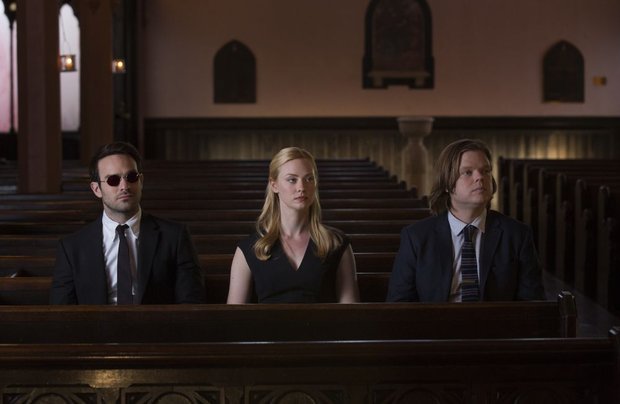
Flash of Inspiration: Why the Camp Works
It’s against the bleakness of the comic book genre where The Flash stands out. It’s not a direly depressing or overly-practical depiction of a superhero. It takes its premise and has fun with it, making jokes about pop culture, and even occasionally poking fun at itself. It doesn’t get as meta or self-referential as something like Deadpool, but the effect remains. In many ways, The Flash feels like a superhero cartoon that happens to be in live-action form. When compared to hits like Batman: The Animated Series or Young Justice, the silliness of The Flash doesn’t feel so off-putting. The approach taken by the showrunners is that the cartoony version of the Flash is a more accurate and accessible depiction than its darker counterparts – even Arrow. While the more grown-up style works great for tackling heady topics like sexual abuse (Jessica Jones) and black culture (Luke Cage), the kid-friendly tone and aesthetic of The Flash is what makes it distinguishable and fun.
Daredevil is undoubtedly a much better crafted show than The Flash, racking in nominations from the Primetime Emmy to the Screen Actors Guild Awards, but it’s targeted to a very specific audience. While the TV-MA rating gives the directors creative freedom, the excessive blood and gore would turn off most Flash fans. Daredevil is concerned with adult themes and content, and so most of the audience demographic won’t be tuning in. On the contrary, The Flash can appeal to both children and grown-ups, men and women, action-junkies and romance lovers (remember, being on the CW means The Flash is no stranger to teen-oriented drama). Shows like Daredevil take their time to tell a long, over-arching story line, while The Flash caters to the attention-deficit viewers by telling episodic stories and keeping scenes brief, with non-expository dialogue to a bare minimum. Daredevil has crime politics; The Flash has speed deities.
The easy accessibility of The Flash is largely responsible for its otherwise puzzling success. The overblown silliness of the show is akin to another comic book crowd-pleaser: the 1966 Batman television series starring Adam West as the Caped Crusader. The campy adaptation of the Batman comics was so well-liked that it was hailed as the “biggest TV phenomenon of the mid-1960s” and spawned a theatrically-released film, which critics called an elevation of camp “to an art form – and has a blast doing it, every gloriously tongue-in-cheek inch of the way” (Rotten Tomatoes consensus). Even fifty years later, the show is fondly remembered – so much so that its fandom has spawned a follow-up animated film in 2016, Batman: Return of the Caped Crusaders, with returning actors Adam West, Burt Ward, and Julie Newmar to voice their original characters Batman, Robin, and Bagirl, respectively.
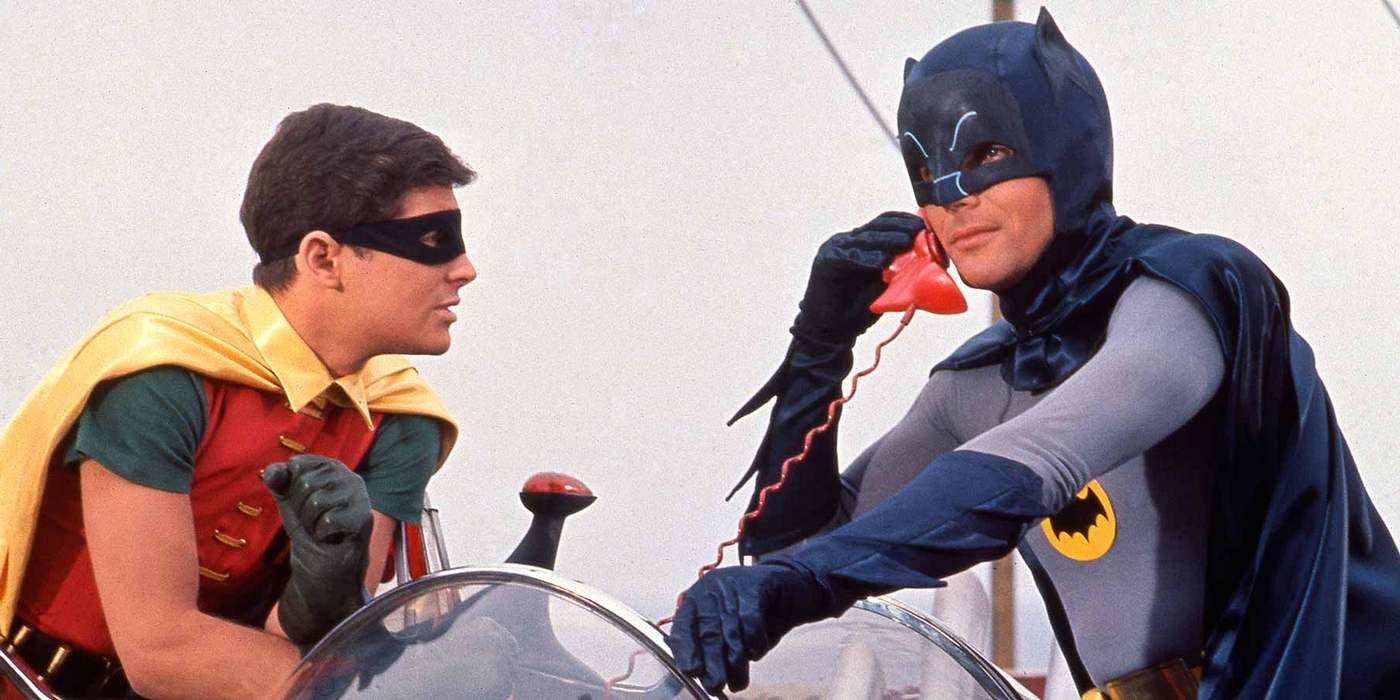
Although the heroes sport corny costumes, employ silly science (ie. exploding shark repellent, physics-defying rope-scaling, etc.), and fight family-friendly villains, the Batman series works because of its intentional cheesiness; everything from the cardboard sets to the outrageous “WHAM!” and “POW!” sound effects give the show its charm, and 21st century audiences are still amused by it. It’s “[f]luffy, good-natured, endlessly quotable fun, just like you remember it,” says one reviewer. The Flash emulates these Batman antics as best as possible with its loony characters and senseless science – not unlike its predecessor. The 1990’s saw its own cheesy incarnation of The Flash starring John Wesley Shipp, who went on to play Barry’s father in the 2014 show, as well as a version of Jay Garrick (the original comic speedster) that was heavily inspired by Shipp’s portrayal of Barry Allen in his show. Amanda Pays and Mark Hamill, who were featured on the 1990 Flash, have also returned for several episodes as their previous characters.
The predictability of the characters and plotlines in The Flash bear resemblance to the Adam West Batman; neither are particularly interested in layered, cathartic narratives. They just want to entertain. The comedic beats of both shows are always timed well, and the action is staged in a way to engender feelings of excitement as opposed to genuine suspense or tension. There’s no sense of danger in The Flash or Batman, and that works to its advantage. With its eye-pooping colour schemes, recycled sets, and cosplay-level costume design, these two shows establish an atmosphere of play. The audience is often reminded by these aesthetic giveaways that it’s all just pretend, rather than the show absorb viewers in the grandiose, big-budget fashion of Game of Thrones, which spends an estimated $6 million per episode to create authentic costumes, set designs, and so forth.
Mark Hamill’s turn as the maniacal “Trickster” comes as no surprise, as he’s been associated with DC for over twenty-five years, having voiced the Joker in several animated shows and video games. His performance as the madman James Jesse in The Flash is considerably more cartoony than his creepy voice work as Joker, and two decades after the 90’s show, Hamill expressed concerns about returning to his spandex jumpsuit for a second run. In an era where fans are embracing cold and calculated comic book adversaries like the terrifying Killgrave in Jessica Jones or Heath Ledger’s Oscar-winning performance as Joker (The Dark Knight), it’s an admirable risk to present silly stereotypes like the Trickster in The Flash. Award-winning actor Wentworth Miller seems to enjoy playing his character of Leonard Snart with extreme exuberance; Captain Cold now has a very recognizable and strange bad guy accent, heard also in Danielle Panabaker’s Killer Frost and Katie Cassidy’s Black Siren.
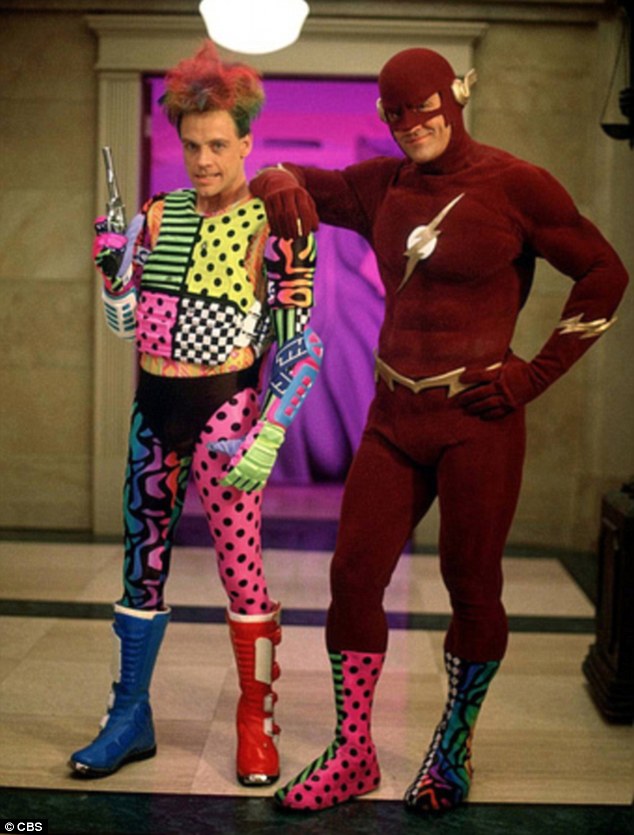
The Flash revels in its weirdness. In “Versus Zoom” (Season 2, Episode 18), Barry is forced to give up his speed powers to the evil Hunter Zolomon. Upon receiving Barry’s super speed, actor Teddy Sears goes all-out, making over-the-top, almost-orgasmic shrieks of delight. Wacky decisions like this scene would never make the cut on Marvel’s Netflix catalog, or even Marvel’s Agents of Shield. They exist in the playful sphere of The Flash‘s universe that has since carried out into the even more outlandish Legends of Tomorrow. One such cross-over event with LoT that included Arrow and Supergirl involved an alien invasion where the DC superheros are kidnapped and mind-controlled by green creatures whose design looks like it came out of a 1950’s sci-fi film. Daredevil would never dare to include an extraterrestrial plot device, in spite of existing in the same universe as The Avengers (which would include the existence of the Asgardians and the Chitauri).
The “Invasion!” episode even included an entirely CG-rendered shot of a Dominator in his alien star craft that was obviously fake, but the fans don’t care; The Flash knows that spaceships are cool, and viewers at home agreed. The three-part TV event received high praise, described by Oliver Sava of The A.V. Club as “a hell of a lot of fun” for expanding the mythology of the shows’ universe. Whether its more characters with super powers or more alternate dimensions to explore, The Flash never shies away from an entertaining story, no matter how ludicrous. It’s ambition to embrace the cheesy is what separates The Flash from the other comic book shows on TV, and even in film. Batman V Superman: Dawn of Justice was subject to severe backlash, much of which was in response to the overly-ominous and depressing tone. Director Zack Snyder’s depiction of Superman is in stark contrast to the “trust, justice, and the American way”-esque character from the comics and Christopher Reeve films. Fans have expressed disappointment with how Superman has become a gloomy shadow of his original character, but they continue to cheer for the happy-go-lucky nature of The Flash.
The success of The Flash has probably been a motivator for DC’s films to shift into more positive territory, seeing as how their first few attempts have failed to work. The producers of the upcoming Justice League film, which features its own version of the Flash, have assured audiences that this next installment is going to have more jokes and less brooding. The notable bright spot of the first Justice League teaser trailer is Ezra Miller’s lighthearted take on the Barry Allen character – an element far more in line with The Flash TV show than anything else seen in the DCEU thus far. Although Grant Gustin won’t be making the transition to the silver screen, his energetic spin on the Flash is likely a major influence on the studio’s decision to rethink their tone.
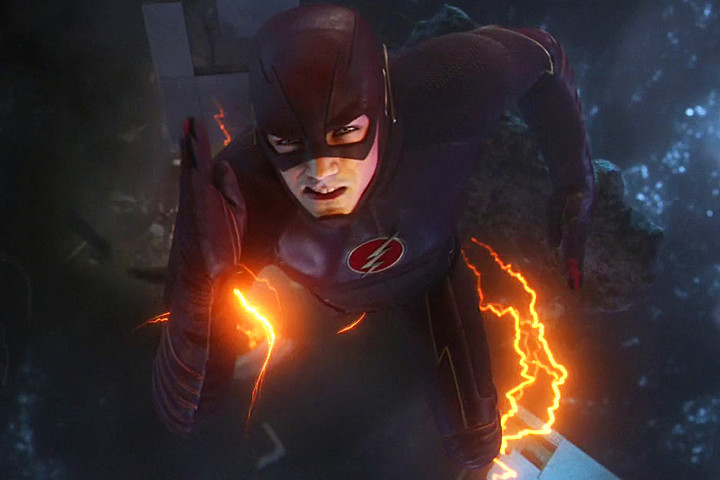
The Flash is not a great show, but in its defense it has never tried to be. It lives on as a sort-of spiritual successor to the 1960’s Batman, with all of the campy glory that helped solidify Adam West as the people’s choice Batman. For many children, The Flash will be a gateway into the comic book world, whereas gritty shows like Daredevil fail to speak to a vast demographic. It’s as fascinating as it is frustrating, and the silliness of the show gives it its appeal. “What I bring to [the show],” said director Kevin Smith, “which is why I got to come back and also do Supergirl, is boundless enthusiasm. I direct that show like I’m a baptist preacher on coke. It’s like where saving the world as much as making an hour of television, and that’s because the subject matter is so close to my heart. The writers do such a fantastic job. They’re soap operas for people like me.” The Flash will probably never amount to greatness, but it will undoubtedly always have an audience.
What do you think? Leave a comment.











The Flash is one of DC’s most one dimensional characters, and its not a bad thing.
Barry is just straight up a really nice guy. That’s his thing. He’s not conflicted. He’s not emo. He’s not got secret perversions. He’s not burdened by feelings of isolation. He’s not uptight about anything. He’s not a hypocrite. People relate to him. People like him. He likes people. Heck, even his enemies like him.
In the context of a team, Barry is the guy everyone can rally around when everyone else’s personal problems are becoming a distraction. Everyone would put everything on the line for The Flash, because they know he’d do the same. If Barry was a motto, he’d be: “He’s always there for you.”
Watched the pilot a few months back, couldnt get into it after the excellent Arrow
I fear the producers will not be brave enough to go with the breeziness of the early comics where the uncomplicated Flash fought some uncomplicated villains who were even sillier than most silly super villains.
I watch The Flash and this article makes me look at it in a different light
It does seem like it was made by fans, for fans.
The biggest element I see is all the characters are complete emotional weaklings.
i usually get quite bored of super hero TV shows but this is authentic and amazing. the first season is nail biting and the second season is just as good.
We need some tv shows about supervillains.
So Despicable Me the TV show?
You can never have enough superhero shows; unfortunately Flash is insipid and boring.
A welcome break from the DC movies, where everything is relentlessly grim and serious. I wish the producers of this could do the Superman movies – Man of Steel was the bleakest blockbuster in recent memory.
The original 1990 series was much better.
It really wasn’t.
It was worth watching if only for the art direction which gave it the right stylised look, albeit not quite the same as the comic book. It had wit and charm and wasn’t as teen oriented as the latest outing.
The suit was better too.
Lost interest in this show after Barry revealed his identity to Iris.
The 1990 Flash series was excellent and now seems like a dry run for Gotham but minus the hero shaped hole in the middle.
The new Flash is awful.
It’s really great. Arrow took until series 2 to become properly brilliant, and just as the third series was dragging, Flash seemed to take up the slack and put them into stark contrast, tone-wise.
Seeing characters who are nowt but doom and gloom in Arrow suddenly start playing for laughs in the Flash crossovers is brilliant, especially Diggle and his story about his cousin and Ray vocally opining about how he seems to fit in better in Central City.
The Flash is one of the goofiest superheros so Im not sure if this be any good.
The Flash is a great superhero series in it’s own right. It is fluffy but it has substance.
Its like the 1950s again but added CGI. Not a bad thing!
It is surprisingly watchable.
This is a really enjoyable series, bright, breezy, and fun, a delightful change of tone from other superhero television series. The crossover episodes with Arrow are fun too, as the contrast really works between the characters.
The hero archetype will always continue. An archetypal motif based on overcoming obstacles and achieving goals, albeit however outlandish, continues to resonate in popular culture. Ultimately, what this means is that whether it is Barry Allen, Batman or any other heroic figure, the main feat: to overcome the monster of darkness, will always continue – regardless of the ‘silliness’ of the show. I for one love the exaggerated archetypes revealed in The Flash and so do countless new generations of fans. Besides, don’t we all need a little ‘boundless enthusiasm’ in our perhaps otherwise dreary lives?
I might give this another go. I thought it was a bit shiny happy 90’s, but people keep saying it’s not bad.
And what’s wrong with shiny happy 90s? (Although the 90s in comics was pretty unremittingly bleak from what I recall…) When everything else is dark and gritty, it’s nice to have something shiny and happy for a change. I’m hoping they don’t end up going dark too soon – the danger is that once there is too much internal continuity, shows tend to end up there. (As opposed to, say, Arrow or Gotham which started dark, of course!)
it is worth trying again, especially since the show is nearing its season 3 finally. although i recommend not watching it on its own, you’ll get more enjoyment out of it if you watch arrow, and legends of tomorrow (one of their newest shows) at the same time
Love this show. I think it is because it is generally upbeat. I find the Arrow so dour and serious. Great effects too. I can’t wait to see the flash of two worlds!
Love the comparisons!!! They are well chosen.
The Flash is probably the best new show on TV.
I want to see The Flash take on Billy Whizz – the ultimate comic book character face-off!
My dad and younger sisters watched it, and I sat in for the last episodes of season 2 and, holy crap, was it painful. My brother loves it, but we found the cheesiness and overdoses of DRAMA almost too much to endure. None of us could fathom how such a cheesy, cliche-riddled and cheap-looking show could be as popular as it is. But your comparison, if this to the 60’s Batman, sheds some light on the phenomenon. I still think it’s a crappy show, but I can respect now a little bit more for what it is, and understand the appeal at least a little bit better.
Arrow dropped in quality after its second season, so it was nice to have The Flash there as a counterbalance.
Despite using “where” instead of “we’re” in the quote by Kevin Smith, and also mixing up the correct usage of “its” vs “it’s” a couple of times, oh and also misspelling “Batgirl” (but it doesn’t matter because Julie Newmar’s character was Catwoman anyway), this article is a good read. And that’s really a lot of typographical errors that could have made it an infuriating task simply to get through the piece.
The author is a Third Year English Major? And someone claims to have edited it? Good grief.
The Flash in my opinion was an excellent show! The cinematic effects and the quality of the story exceeded my expectations. It’s all thanks to Smallville for making these Superhero shows happen. Arrow, Flash, Supergirl, and Legends of Tomorrow wouldn’t be as awesome as they are now if not for Smallville. I love how every episode in every superhero show gets thrilling, and gets you excited that it makes you wonder what’s gonna happen next.
I found this to be an interesting perspective on the Arrowverse, particularly The Flash. Though I didn’t agree with all of it.
The main thing I like about CW’s The Flash is the fact that it’s so light hearted. It’s certainly not the show to turn to when looking for a serious, action packed, fate-of-the-world dependent plot (although there are certainly points where that kind of atmosphere seems to be attempted), but it is a great relief from the shows that, while providing the intensity that is often needed to create a truly suspenseful and captivating show, also tend to create cliffhangers at every corner, and end up killing off or destroying the lives of the characters you love. Sure, this is perfect for a shows popularity, but sometimes all you want is a storyline that doesn’t aim to crush your heart completely every episode.
I find that TV shows nowadays tender towards the more serious. Comic book shows, like DareDevil and Jessica Jones, are amazing and fantastic as dramatic pieces, which is were I would categorize them. But shows, like the Flash, adhere to a simply need to entertain and pleasure.
As much as there are ‘campy’ elements, its not accurate to describe it as anywhere near the 1960s Batman level of camp. It has more relationship with 2001s Smallville, and the teen soapy drama that recides in that show.
Comic books, at least to me, have always felt more like Greek myths of adventure and tradegy, everyone knows the outcomes; they know how each villian of the story is going to behave but you keep watching because you feel this undeniable link with the basic themes; family, friendship, love, achieving greatness over adversaty etc. This is what The Flash brings audiences, the basics of storytelling and a chance to be able to relax. For me, I get the same relaxed and entertained feeling I got from watching Smallville. Redirecting away from the darkness and grittiness to focus on rollicking fun; with the advent of Trump and war in the Middle East, isn’t fun a necessity going into the future.
On a side note, I have to comment on the impact of the show on its big brother, The Arrow. Arrow started out like Batman with a bow and arrow, very serious and deeply entrenched in realism, but now it has gone through a major tone shift and I suspect that thats the reason for the rating drops, because the show has deviated away from its original premise to cope with the demands of the Flash.
There are some things i can agree with, but in this article it’s almost as if you think Batman v Superman and Man of Steel were deep films. These films were too dark and when they tried to shine a light it simply didn’t last long enough. Superhero films should not be taken so seriously, I feel like people only took them seriously after The Dark Knight. A perfect superhero movie or film combines the dark and the light to create a film for the broader audiences. Daredevil is quite a dark show and many would not like to admit this but, after a few episodes of pure darkness it’s depressing and boring. Arrow is starting to get back on the right track after Season 5 and I feel Flash can add more darkness to Season 4. I feel like this article was also written by a person who didn’t watch any of Flash Season 3 which was significantly better than 1 and 2. This is because it added a better overall plot that was a lot darker.
Saying light or dark, is reductive. It’s the consistent tone whether light or dark that makes the show palatable regardless of story lines. Flash season 3 isn’t better because it was darker but because the storyline was just more compelling and better written.
it’s hard to find any re-imagining that doesn’t go for the serious “not your dad’s blank route”
I love the flash. My favorite superhero, witty and smart. This series, thought sometimes with its more than obvious CGI still leaves me wanting more every season finale. Yes, there are moments where I want to slap Iris for being so insensitive, or Barry for being such an emotional wreck, but it appeals to the viewer, it kinda feels human, real if I may say so. Grant is an excellent actor, and the cast have grown to develop their own style and they make it so natural. I expect cheesy and corny humour just cause!
Great article. I agree with your assertion that the success of Flash and Supergirl – and their largely positive tone – is contributing to DC’s shift towards more hopeful films.
great discussion of the different and various iterations of this infamous comic character. The image of Mark Hamill is absolutely priceless.
I’ll be the first to admit I’m not the biggest fan of the Flash (I stopped watching after Season 1) but I think this perfectly exemplifies the appeal of the show for some people. It’s unrepentantly silly and embraces the wackiness in ways almost no other supershows are doing aside from maybe Supergirl. (And I may not be a fan but I do think Captain Cold is vastly superior to most of the other speedster villains. At the very least he’s had more of an arc and solid motivations)
I love this! I could never quite get into the Flash, because I was comparing it to Daredevil, Like Cage, etc. This has explained so much and totally changed my perspective on the show!
In an age of constant criticism and judgement, it’s difficult to have anything in pop culture or genre that you can watch, enjoy and have fun with. I agree that it has its good moments and its interesting moments. A thoughtful, reasonable article that was a good read. Thank you!
A very well written article and an interesting analysis.
I personally, am not a fan of the The Flash, but I think this article does a great job in keeping me interested. I also enjoyed the comparison of both DC and Marvel.
You hit the nail on the head calling The Flash campy–especially when compared to the rest of the Marvel universe. Though, perhaps some of the reason for its surprising success stems from our current cultural moment: we’ve been inundated with news of the downfall of everything from democracy to our planet, so it’s nice to escape a while into something more lighthearted. Whereas other shows in the Marvel universe (from the Netflix canon to Arrow) may be too heavy to allow for the escape we seek, The Flash is just fantastical enough; the plot is too ludicrous (as mentioned in the article) and the graphics are too unrealistic, even for a fantasy show.
Even if the show may try to be allegorical or allude to current events like the other shows in the Arrowverse, it doesn’t do so well enough to be successful and so we can keep going on seeing Zoom as just an evil speedster that needs to be defeated. The world of The Flash stays mostly in the realm of good vs. evil, where there is no gray area, and perhaps, in some way we long for the simplicity of that world.
To an extent the lesser optimism is a symptom of the culture in which the work was created.